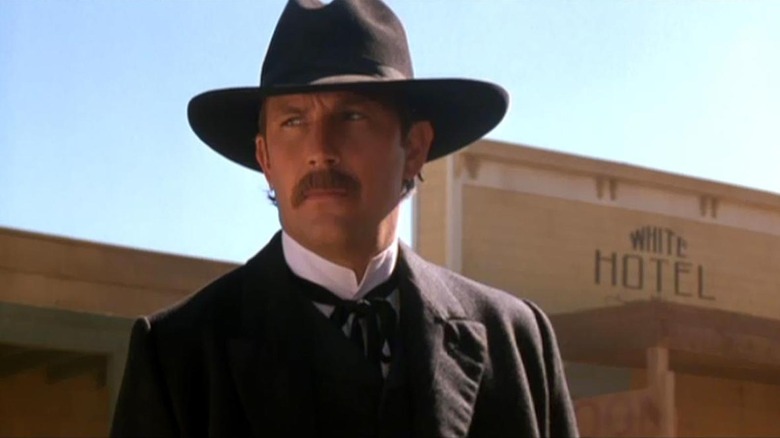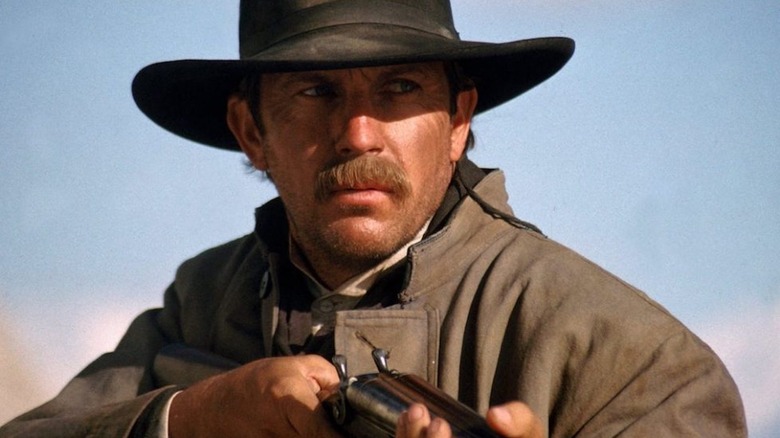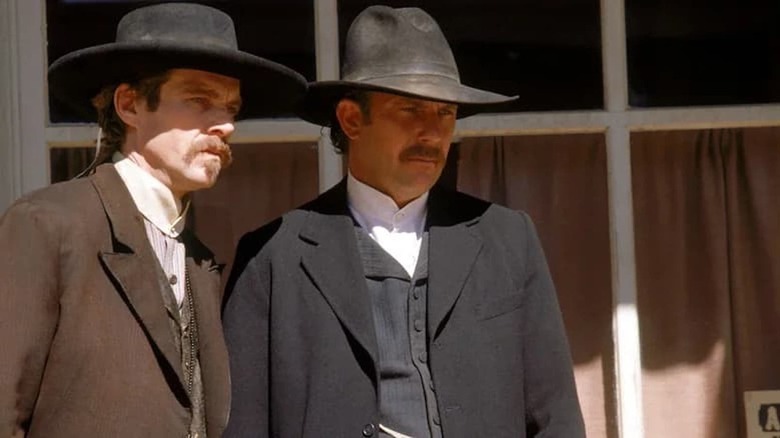Why Wyatt Earp's First Preview Frustrated Kevin Costner
There isn't a single historical figure of the 19th century whose life has been more mythologized via motion pictures than Wyatt Earp. Several great Westerns have been dedicated to his exploits. John Ford's "My Darling Clementine," John Sturges' "Gunfight at the O.K. Corral," and George P. Cosmatos' "Tombstone" are widely considered the best of the bunch. As for Lawrence Kasdan's "Wyatt Earp," a three-hour, swing-for-the-bleachers epic that hit theaters six months after the release of "Tombstone," the consensus holds that it is a film in search of a greater purpose. It's the whole Earp story, but to what end?
One of the most fascinating facets of Earp's life is that he moved to Los Angeles, and served as a technical advisor on silent Westerns made by Tom Mix and John Ford. You'd think a cinephile like Kasdan would want to delve into this subject with antiheroic vigor, but he presents Kevin Costner's Earp as a heartbroken young man who brings law to the teetering-on-lawlessness town of Tombstone, Arizona. His animating passion is family, which is simplistic and kinda dull.
"Wyatt Earp" is a gorgeously dusty film shot by the late, great Owen Roizman, but Kasdan's screenplay, written with Dan Gordon, drifts from incident to incident with little momentum. As a fan of Westerns who's seen all of the films Kasdan is homaging, it's a forgivable indulgence. But is it about anything? Kevin Costner thought so, and he fulminated about the film's negative reception to Roger Ebert.
Costner came out shooting in defense of a three-hour epic
Official reviews of "Wyatt Earp" were still embargoed when Ebert spoke with the star, who was riding a box-office winning streak that stretched back to 1990's "Dances with Wolves." Unfortunately, entertainment journalists were primed to report on an ego-driven flop, and they cited a poorly received preview screening in Century City to support their collective hunch.
Costner, however, was proud of the film, and preemptively lashed out against the critical brickbats to come.
"It's frustrating for me when people don't pay attention to detail; it's a hard thing and I wish I could cut that part of my brain out but I can't. There's certain parts of it that are hard for me. I'm a little tired right now of movies. I just want to step back away. I've got one more movie yet to do in this run right now and then I'm going to stop for a while. I just want to rethink it a little bit."
A Western for Western lovers, and probably no one else
Hollywood had decided Costner was an out-of-control egomaniac at this point, and he wound up gifting them an opportunity for a career-killing takedown one year later with the wildly over-budget "Waterworld." The film was dubbed "Fishtar" before anyone got a look at the finished product, and, well, the naysayers ate a heapin' helpin' of crow. "Waterworld" was a hit. Costner finally served up the box-office bomb his detractors had been waiting for in 1997 with "The Postman," but he learned from that debacle and never overreached again.
As for "Wyatt Earp," there's nothing time can do for that movie. It's a spacious film with a lovely score composed by James Newton Howard and a superb performance from Dennis Quaid as Doc Holliday. You can get lost in it, and you won't regret the three hours you spend in that world. But if you don't have that kind of time, cue up the film's teaser trailer on YouTube, bolstered by Ennio Morricone's score for "A Time of Destiny." That's the definitive cut of the movie.


